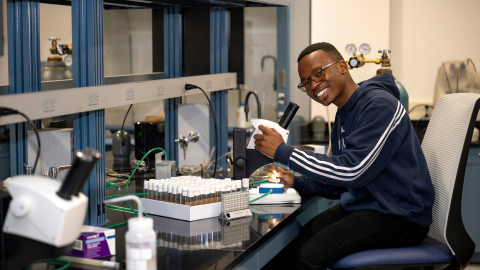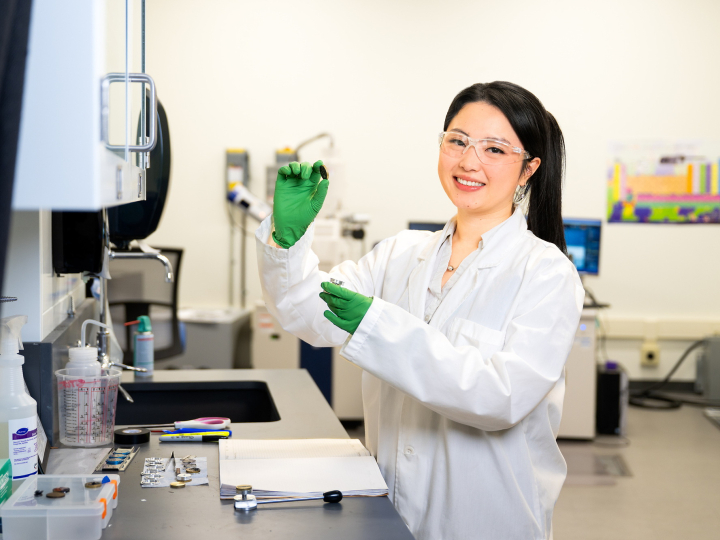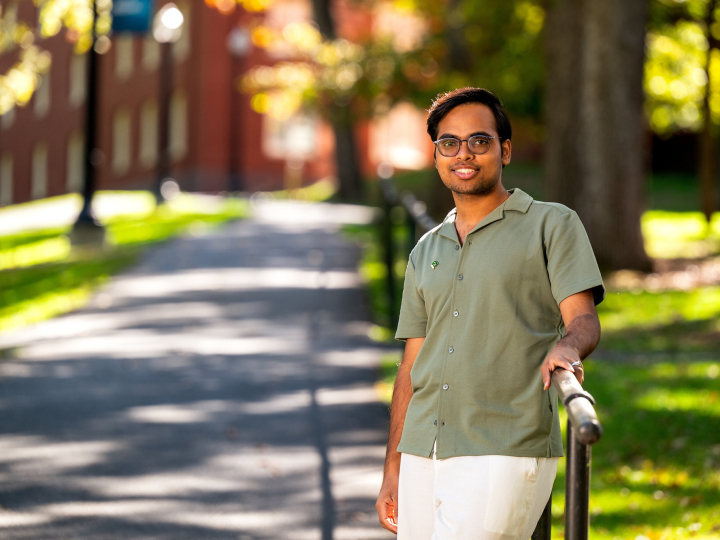
Monwabisi Qeki '28, Neuroscience
November 19, 2025
Monwabisi Qeki '28 wants to advance equitable health care and empower young Africans through research, innovation and policy engagement. Photo by Emily Paine, Marketing & Communications
"Bucknell has given me a lot of opportunities to grow my mindset."
When Monwabisi Qeki '28 stepped up to the microphone at the United Nations General Assembly in New York City in October, he was speaking not only for himself but for millions of young Africans whose voices too often go unheard.
Representing the African AI Village and Mtoto News International, Qeki joined a panel on "The Future of AI in Africa: Bridging Policy, Practice and Research." His message: Youth must be seen not as beneficiaries of innovation, but as partners in building it.
"Participation is not a favor," Qeki told the audience. “It's a necessity. We must move beyond consulting with young people to co-creating with them."
The moment marked the culmination of years of advocacy for children's rights and digital inclusion in his home country of Lesotho.
Lesotho — known as "the kingdom in the sky" for its dramatic mountain landscapes — shaped Qeki's desire to "reach higher" in everything he does. He remembers long hospital lines and scarce health care resources in his community, experiences that fueled his decision to major in neuroscience at Bucknell.
"I saw people waiting hours, sometimes days, to see a doctor," he says. "I promised myself I'd work to change that."
At 16, Qeki published a poetry collection titled Young Mindsetters, which explored themes of rejection, discrimination and hope. Around the same time, he launched the Information Today for Use Tomorrow campaign, a student-led mental health initiative that hosted online support discussions during the COVID-19 pandemic.
His advocacy caught the attention of the Ashinaga Foundation, a Japan-based nonprofit that supports students in Sub-Saharan Africa who have lost one or both parents. The organization encourages its scholars to give back by returning home or driving innovation and development in their communities. Impressed by his dedication, the foundation awarded him a scholarship to pursue higher education abroad.
"They saw my story and believed in my potential," he says. "That's how I came to the U.S., and eventually, to Bucknell."
Finding Purpose at Bucknell
When Qeki was considering universities, he wanted a place where he would be "a valued member, not just a number."
Bucknell's close-knit community and strong emphasis on faculty mentorship drew him in.
As a neuroscience major, Qeki is focused on the intersection of health, human development and equity, with an ultimate goal of returning home to establish a neuroscience research center in Lesotho.
"I want to develop culturally sensitive mental health and brain therapy protocols," he says. "My dream is to combine research with medicine — to pursue an M.D./Ph.D., fearlessly pursuing my goals and opportunities for support to help me design innovative protocols to address health care disparities for marginalized people in Lesotho."
He's already getting involved in research on campus, working with Professor Mizuki Takahashi, animal behavior, and plans to continue with the lab throughout his studies at Bucknell. This summer, they plan to go to Japan as part of their research on amphibians.
Beyond the Classroom
Outside academics, Qeki works in the Office of Student Affairs, a role that grew naturally out of his habit of stopping by just to say hello to the Dean of Students' leadership team.
"I've always been the kind of person who visits the principal's office not because I'm in trouble, but just to check in," he says with a laugh. His frequent visits — always accompanied by warmth and genuine curiosity — eventually led the staff to offer him a student position in the office.
Now, one of his favorite responsibilities is delivering Bucky Pins to students, faculty and staff who are recognized for building community and fostering connections on campus. Rather than simply dropping them off, he insists on handing them out himself. "A simple smile can change someone's day," he says. "Coming from a country with one of the highest suicide rates in the world, I believe kindness matters."
He also serves as a community-engaged learning assistant with Bucknell's Center for Community Engaged Leadership, Learning & Research and as a fellow in the Society and Technology Residential College, where he explores the intersection of ethics and innovation.
This past summer, Qeki interned with the Free Clinic of Central Virginia through the Shepherd Higher Education Consortium on Poverty. There, he worked in medical and dental clinics, providing care to uninsured patients.
"It opened my eyes to the fact that poverty looks different in every country, but it still traps people in the same way," he says. "It reminded me why I want to dedicate my life to equitable health care."

